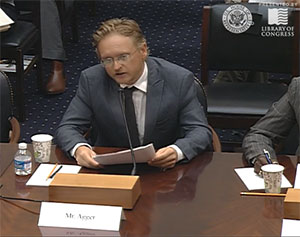
On May 1, 2014, Enough Project Field Researcher Kasper Agger testified before the U.S. House Committee on Foreign Affairs, Subcommittee on Africa, Global Health, Global Human Rights, and International Organizations, which convened to hear experts from the State Department and NGOs discuss "The Central African Republic: From 'Pre-genocide' to genocide?." Panel experts additionally included The Honorable Robert P. Jackson of the Bureau of African Affairs, The Honorable Anne Richard of the Bureau of Population, Refugees and Migration, Mr. Scott Campbell of Catholic Relief Services, Ms. Madeline Rose of Mercy Corps, and The Honorable Robin Renee Sanders of FEEEDS Advocacy Initiative.
As violence persists and humanitarian needs multiply at an alarming rate, panelists outlined a broad range of challenges facing international and regional actors trying to alleviate the conflict in the Central African Republic (CAR). Since December 2013, the conflict has resulted in roughly 643,000 internally displaced persons and an additional 100,000 refugees to the more than 200,000 that were already living in neighboring countries. The mass killings and human rights abuses as well as the risk of famine due to violence inhibiting the planting and harvesting seasons require an urgent response from the international community.
As Subcommittee Chairman Chris Smith (R-NJ) presided over the hearing along with Ranking Member Karen Bass (D-CA) and led the discussion between members of Congress, including Representatives Weber (R-TX), Marino (R-PA), Meadows (R-NC), and panel experts concerning the U.S. role in helping to resolve these issues. Several panelists emphasized the need to: a) accelerate the deployment of the United Nations Multidimensional Integrated Stabilization Mission in the Central African Republic (MINUSCA), as “delay is denial to the people,” said Rep. Smith, b) expand the capacities of MINUSCA, particularly in regards to civilian protection and policing, c) support peacebuilding and reconciliation efforts from the bottom-up and, d) fulfill critical humanitarian needs through increased logistical and financial support.
While panelists commended the role of the U.S. in providing substantial humanitarian aid, appointing Ambassador W. Stuart Symington as U.S. Special Representative for CAR, and pushing for the U.N. peacekeeping operation, each underlined the need for continued and sustained involvement in immediate humanitarian relief. In addition, several panelists emphasized the need for long-term support focused on rebuilding state security, justice, and service structures and on addressing regional relationships in order to bring durable peace to CAR and the region.
In his testimony, Enough Project Field Researcher Kasper Agger stressed:
“As the U.S. crafts the future of its critical engagement in CAR, I urge Congress and the Administration to not only target the acute, immediate needs created by the conflict but also pursue sustained U.S. engagement that addresses the core underlying drivers of conflict that could incite continuing cycles of violence.”
Agger also emphasizes these same ideas in a newly released report based on three-weeks of field research in CAR. Featuring satellite imagery, the report explores the underlying drivers of the conflict, including regional dynamics and natural resource exploitation. Additionally, he finds that the illicit trade in diamonds and elephant ivory is supplying armed groups, and regional oil interests have shaped alliances. The Enough Project has been closely following the crisis in CAR and urges the U.S. government and international community to support peace and help stop the cycle of violence.
Read Kaper Agger’s Full Testimony.
To read more about CAR’s history, see Enough’s CAR conflict page, and to learn more about what you can do to support peace, see Enough’s take action page.

